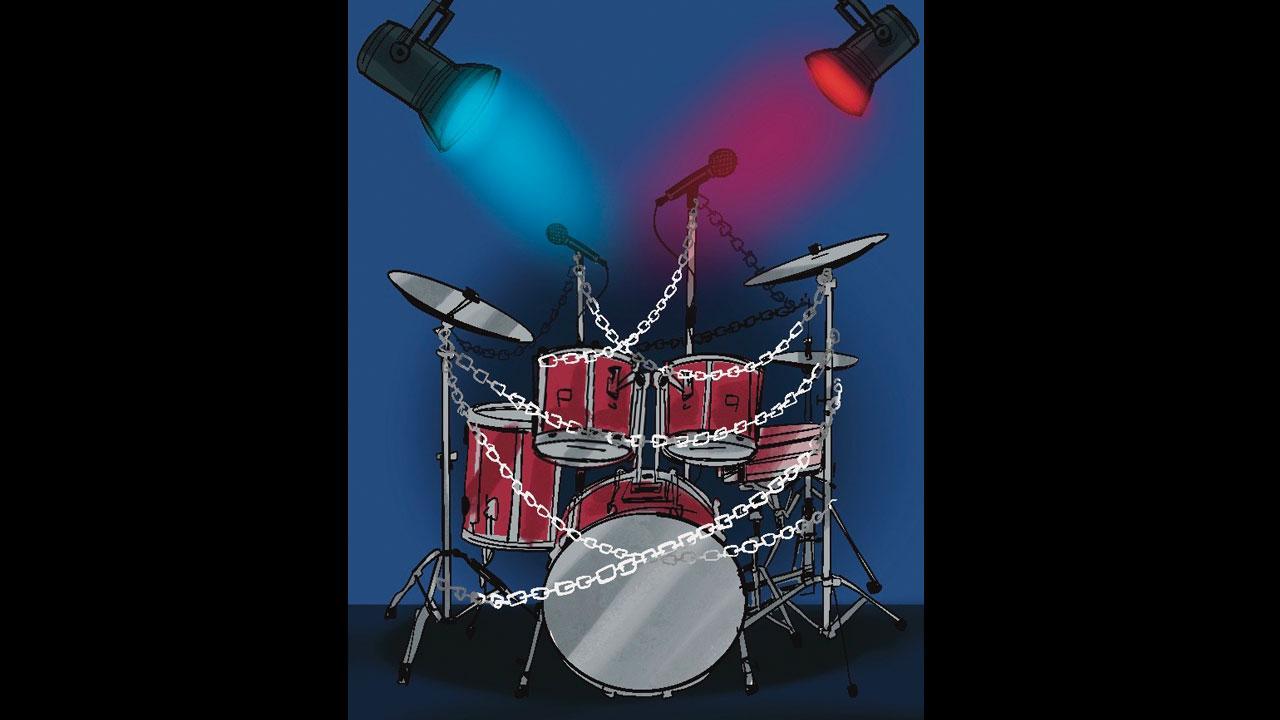The fan favourites, the front men, the female magnet maybe someone else, the guitarist or the vocalist most often, but it’s the drummer who’s the backbone, the bedrock on which a band is built

Illustration/Uday Mohite
The Rolling Stones have lost Charlie Watts, their drummer and irreplaceable heartbeat. In his passing, a massive era has come to an end.
ADVERTISEMENT
The drummer is often the soul of a band, not always the leader, but the life blood. The fan favourites, the front men, the female magnet maybe someone else, the guitarist or the vocalist most often, but it’s the drummer who’s the backbone, the bedrock on which a band is built.
Rock and metal drummers have always been my bag—the showy show ponies, the skillful soloists. In the late ’70s, I went for the power drummers, the speed of Deep Purple’s Ian Paice, the muscularity of Rainbow’s Cozy Powell, the precision of Led Zeppelin’s John Bonham, the philosophical Ayn Randness of Rush’s Neil Peart and the prodigious solos of Santana’s 17-year-old prodigy Michael Shrieve; watching our own Ranjit Barot at Wild Acres, the 1975 desi Woodstock, spellbound by the reggae rock of Police’s Stewart Copeland at Rang Bhavan in 1980, and later by Dream Theater’s symphonic Mike Portnoy and the percussive inventiveness of Tool’s Danny Carey.
To me, The Beatles’ Ringo Starr and Charlie Watts, suffered by comparison for their steadfastness.
They didn’t engage in drum solos, the dramatic clashing of cymbals, the sheer showmanship, is what I was drawn towards. These men, especially Watts, exhibited subtlety. He added swing to the Stones’ sound, being primarily a jazz man—he had a lazy eloquence.
“I don’t like drum solos,” Watts once said. “I admire some people that do them, but generally I prefer drummers playing with the band. The challenge with rock’n’roll is the regularity of it. My thing is to make it a dance sound—it should swing and bounce.”
It was the ‘snare’ sound of Watts, that Bruce Springsteen defined as the hallmark of The Rolling Stones.
The Stones’ guitarist Keith Richards once famously said, “Charlie Watts has always been the bed that I lie on musically.”
All bands falter when their percussionists expire or retire—who will keep the backbeat going, for the rest of the musicians to revolve around? Do you replace and move on? History has shown that drummers are impossible to replace—the reason being for some, they’re the primary songwriters, while for others they represent the soul of the sound.
Robert Plant and Jimmy Page were the poster boys of Led Zeppelin, but their journey as a quartet ended in 1980, when John Bonham climbed his stairway to heaven. Rush took a forced sabbatical in 1991, when Neil Peart took off on a 88,000 km bike ride to surmount the double tragedy of losing his wife and daughter within 11 months. They disbanded permanently when Peart passed away in 2020; Keith Moon’s overdose in 1978, left The Who in tatters, unable to continue.
The Stones, are way past their prime, but still 60 years together is long—the members are ageless, touring in their 70s, still making magic for their legions of fans. And now, they’ve lost their dapper drummer.
In 2016, Metallica’s drummer Lars Ulrich said he wanted to keep playing into his 70s, and that he looked to Mr Watts as his role model. “The only road map is Charlie Watts,” Ulrich said.
The Doors’ John Densmore put it best, “Charlie was one of the great time keepers, and when you master great time, you achieve timelessness.”
Rahul daCunha is an adman, theatre director/playwright, photographer and traveller. Reach him at rahul.dacunha@mid-day.com
 Subscribe today by clicking the link and stay updated with the latest news!" Click here!
Subscribe today by clicking the link and stay updated with the latest news!" Click here!






